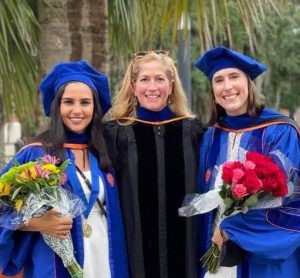 We are so pleased to introduce Dr. Anne Mathews, RDN to the Discover FSHN Series! Dr. Mathews is an Associate Professor in the Food Science and Human Nutrition Department at the University of Florida. She is dedicated to promoting healthy nutrition behaviors, prevention of chronic disease, and addressing food insecurity. Learn more about her path to UF, her current projects devoted to positive nutrition behaviors, and what she believes is the most important fact the public should know about nutrition.
We are so pleased to introduce Dr. Anne Mathews, RDN to the Discover FSHN Series! Dr. Mathews is an Associate Professor in the Food Science and Human Nutrition Department at the University of Florida. She is dedicated to promoting healthy nutrition behaviors, prevention of chronic disease, and addressing food insecurity. Learn more about her path to UF, her current projects devoted to positive nutrition behaviors, and what she believes is the most important fact the public should know about nutrition.
Tell me about how you became interested in the relationship between adiposity, lifestyle behaviors, and chronic disease.
I am a registered dietitian, and for several years, I counseled adults for obesity, diabetes, and various heart diseases. Then, I took a position with a physician, Dr. David Kelley, doing research in this very area. I quickly became invested in understanding and asking the research questions myself, and with the support of Dr. Kelley, I decided to go back to graduate school for a doctoral degree at the University of Pittsburgh.
Diet and nutrition are the most important modifiable risk factors for disease in our society […] Finding ways to make this process easier and more enjoyable is imperative for improving the health of our citizens.
For my dissertation project, I studied the effect of aerobic exercise on fat oxidation in adults with obesity, with and without diabetes, and found that adults with diabetes responded to aerobic training just as well as those without diabetes.
I was extremely fortunate to find a position at UF after graduating. Since joining the FSHN Department, my research has been less mechanistic and more centered on HOW we can support individuals and communities in adopting and maintaining healthy behaviors, like eating a whole food diet and being active daily. We know these behaviors are so important for disease prevention and management, but they are often difficult to do day in and day out.
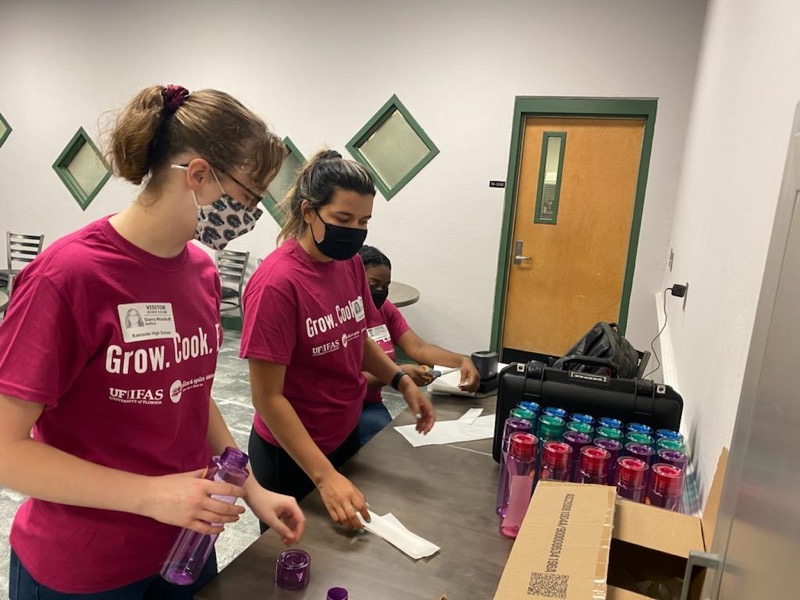
Would you share some of the recent projects you are working on?
Our current projects are:
(1) Nutrition in a Box. Funded by the Walmart Foundation, we partnered with seven high schools in three Florida communities to address low-income families’ access to fruit and vegetables. In this program, high school agriscience students grow vegetables and herbs and send them to high school culinary arts programs. These produce items are incorporated into meal kits for families. The Slice and Spice meal kits are modeled after for-profit companies like Hello Fresh, and they come with recipe cards, nutrition tips, and all the premeasured ingredients needed for three dinner meals for a family of four.
In addition to studying the impact of participation on families’ diets and psychosocial effects, we are also studying how student involvement in the project may impact their food choices and healthy eating intentions. Academic outcome measures include critical thinking skills, nutrition knowledge, and career intentions.

(2) Recipe for Heart Health. This randomized clinical trial is a pilot study to understand the independent benefits of olive oil on markers of cardiovascular disease (CVD) risk within a whole food vegan diet. Classes are delivered via an online teaching kitchen intervention for adults at high risk for primary CVD. I am amazed at how well the classes run via video with the participants working in their own home kitchens!
Tell me about your food security project.
(3) Food Security and Health Behaviors of College students. We recently completed a small suite of studies in which the overall goal was to improve the nutrition behaviors of college students. These studies included a special focus on reducing barriers to food access, especially for students experiencing food insecurity.
In one of the studies, we developed a large multi-institutional project seeking to improve the health behaviors of college students, and we are still actively analyzing and publishing outcomes. The project is a study of food insecurity among students at UF and prompted the creation of videos to combat barriers to the use of the Hitchcock Field and Fork Pantry, including lack of information and stigma. We also focused on intervention activities to increase the knowledge and cooking skills of students.
Any other projects?
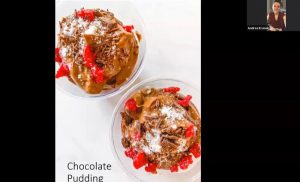
(4) Finally, this fall/spring we are launching a new study for first-year students focused on the Mediterranean Diet and mental health. Cross-sectional reports have found an inverse correlation between diet quality and symptoms of anxiety, stress, and depression. While mental health may impact a person’s desire and ability to put together a healthful meal, we also hypothesize intake of nutritious foods may mitigate mental health conditions. Specifically, student participants with and without symptoms of anxiety, stress, and depression, with different measures of food insecurity, will be randomized to one of the following:
- A 12-week diet intervention,
- A 12-week diet intervention, plus the support of an app to help manage anxiety and stress,
- A health education control group.
Our primary outcome is a change in symptoms of anxiety, stress, and depression.

What classes do you teach?
(1) HUN 4446 – Nutrition and Disease Part 2
(2) HUN 4936 – Preventative Health Experience
These two classes work well together because one focuses on disease prevention and the other on management after disease development.
(3) HUN 4936 – Research in Nutrition and Food Security: I taught this class in the spring of 2021 and am debating whether to teach it in 2022!
What do you feel has had the greatest impact on you as an educator?
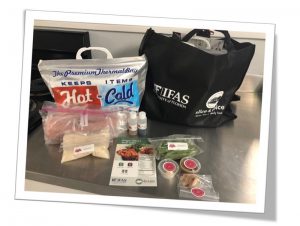
I have been very fortunate to be mentored by some of the best teachers in our college! UF offers a lot of support for becoming a more effective teacher, but it takes time and effort to take advantage of such opportunities. In general, my experiences as a registered dietitian, including supporting others in adopting health behaviors and watching their pride as they reach their goals, translate nicely to teaching and watching students get excited while learning about health and nutrition.
What do you believe is the most important fact the public should know about your research area?
Diet and nutrition are the most important modifiable risk factors for disease in our society. Yet putting together a consistently nutritious diet is incredibly difficult for so many people for a variety of reasons. Finding ways to make this process easier and more enjoyable is imperative for improving the health of our citizens, and that is my goal.
What do you like to do in your free time?
My favorite things to do are watch my two teenagers row with Gainesville Area Rowing and hike with my two dogs, husband, and kids!
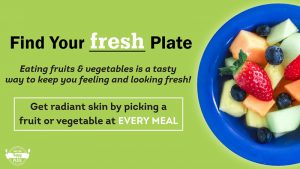
What is the most unusual food you’ve ever eaten, and how did you come across it?
Oh, I’m not one to eat bugs or anything I’m unsure of – haha!
Is there anything else you would like to add?
Will we ever eat significantly more healthfully as a nation? Yes, but not without systemic changes to our food environment and policies, and not without health care shifting to focus much more on prevention.
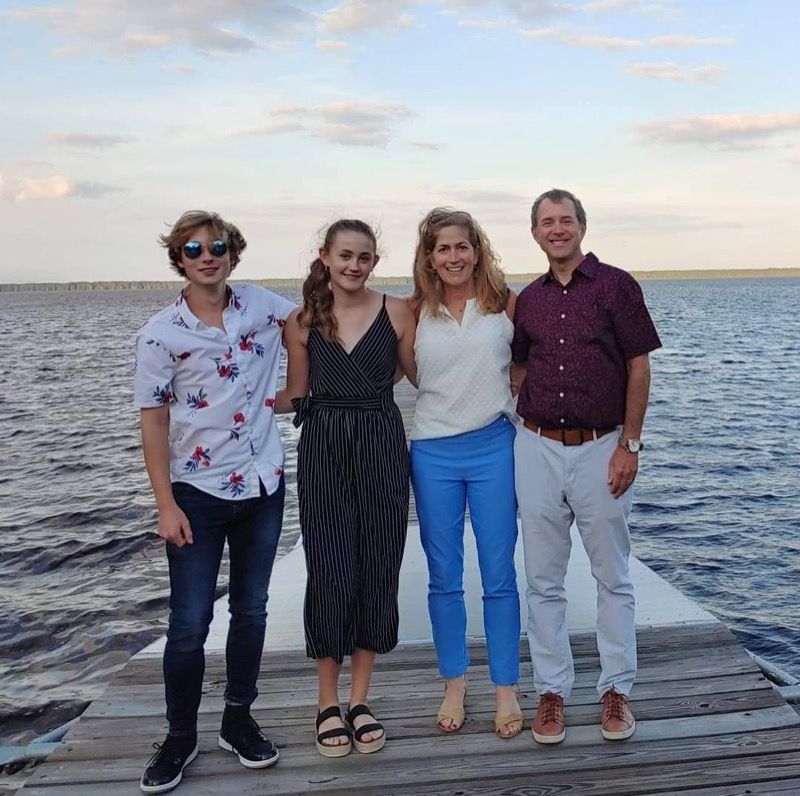
Note: Some images in this post were taken prior to national guidelines of face coverings and social distancing.
Interested in learning more about FSHN’s Nutritional Sciences programs? Read more here and here and here!
P.S. The Discover FSHN Series highlights the unique experiences of UF’s Food Science and Human Nutrition students, faculty, staff, and alumni. Want to read more about the amazing work going on in the FSHN department? See our previous features below:
Undergraduate Students:
Shannon Mai, Dietetics
Alex Colon, Dietetics and Jenny Duong, Food Science
Jackie Shannon, Nutritional Sciences
Jennifer Jordan, Food Science
Lily Tucciarone, Dietetics
Tim Cassella, Nutritional Sciences
Graduate Students:
Savanna Curtis, Food Science (M.S.)
Carley Rusch and Matthew Beke, Nutritional Sciences (Ph.D.)
Alexa Hosey, Dietetics (MS/DI)
Vicnie Leandre, Food Science (M.S.)
Rufus Theophilus, Nutritional Sciences (Ph.D.)
Amber Fritsche, Dietetics (MS/DI)
Amy Jones, Food Science (Ph.D.)
Postdoctoral Associates:
Dr. Cameron Bardsley, Food Safety
Dr. Tautvydas Shuipys, Food Safety
Faculty:
Dr. Naim Montazeri, Food Science/Food Virology
Dr. Jeanette Andrade, Dietetics
Dr. Zhiyong Cheng, Nutritional Sciences
Dr. Juan Andrade Laborde, Global Nutrition
Dr. Razieh Farzad, Food Science
Dr. Beth Gankofskie, Dietetics
Staff:
Sharyn Passeretti, Lab Specialist
Herschel Johnson, Manager of Student Services
Brandy Johnson, Administrative Assistant
Alumni:
Dr. Rebecca Gould, Dietetics, Postdoctoral Research
Dr. Becca Solch, Nutritional Sciences, Postdoctoral Research
Hannah Cooper, Dietetics, Private Practice
Dr. Richie Li, Food Science, Product Development
Doctor Brian Barrow, Nutritional Sciences, Medicine/Physician
P.P.S. Learn more about FSHN’s renowned programs below!
Undergraduate Programs:
Dietetics
Food Science
Nutritional Sciences
Graduate Programs:
M.S. Dietetic Internship Program
M.S. Food Science and Human Nutrition
Ph.D. Food Science
Ph.D. Nutritional Sciences
 0
0
